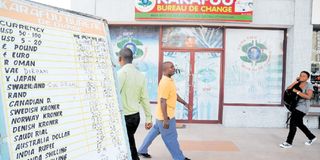Central bank on fresh move to control bureaux de change

Pedestrians passes by a bureau de change. BoT wants all forex operators to apply for new licences.
PHOTO | FILE
What you need to know:
BoT has issued new licensing conditions to forex dealers operating in the country to check grand corruption and money laundering
Dar es Salaam. The Bank of Tanzania (BoT) has instituted new measures to curb operations of bureaux de change as a move regarded by some analysts as part of the government’s crackdown on grand corruption and money laundering.
On Wednesday BoT issued new licensing conditions to foreign currency (forex) dealers operating in the country as part of the implementation of President John Magufuli’s directives he gave during an impromptu visit to the bank’s premises on March 10 last year.
During the visit he urged BoT governor Benno Ndulu to scrutinise forex bureaux de change to check money laundering.
Among the measures taken on Wednesday included revising minimum capital thresholds for all bureaux de change and increase its non-interest bearing deposits.
“The minimum capital threshold has been increased from Sh100 million to Sh300 million for class A and from Sh250 million to Sh1 billion for class B,” said BoT’s statement.
BoT has also increased the non-interest bearing deposit from $50,000 to $100, 000, the statement adds. New capital levels are scheduled to take effect three months from June 2 this year as per the Government Notice 223 to give time to forex dealers to apply afresh for licenses.
In that effect the central bank has also suspended accepting new applications for licensing of bureaux de change until further notice in what it says is a measure to assess the existing bureaux de change.
“No person shall become shareholder, director, a member of the management or staff in more than one bureau de change,’’ BoT furthers says in the statement.
BoT has also encouraged forex bureaux de change to merge to ensure smooth operations. An expert, who spoke to The Citizen on Saturday said the central bank’s move was likely to ensure efficiency in the supervision of forex bureaux de change and would help crack down on money laundering in the long run.
Dr Donath Olomi from the Institute of Management and Entrepreneurship said the idea of encouraging merging was meant to make regulations more efficient.
“It is also better to have fewer, bigger bureaux de change operators than having many and small ones. In fact having too many forex bureaux de change creates loopholes for corruption and money laundering.”




